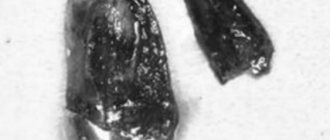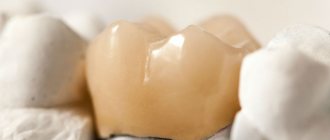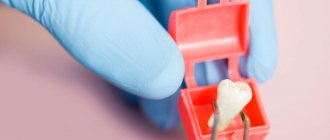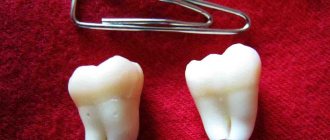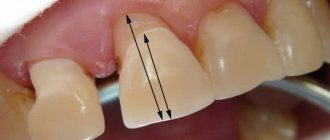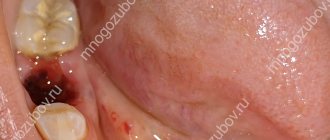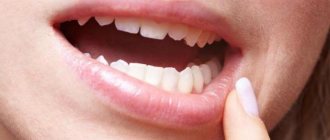In what cases can you swallow a removable denture?
Modern bridges and crowns are lightweight and compact in size so that the patient does not experience discomfort when wearing them. Therefore, situations where a person swallowed a denture cannot be ruled out. Regular preventive examinations at the dentist, careful care and compliance with the orthodontist’s recommendations help prevent the problem.
What to do if a denture is swallowed
Most unpleasant situations occur during sleep or while eating. The main rule is not to panic and not to try to prescribe laxatives on your own.
It is necessary to urgently consult a doctor to find the safest and most comfortable solution.
Most modern prostheses are made from high-quality materials, so poisoning and intoxication are excluded.
But the problem should not be ignored: old crowns may have sharp chips or break when chewed. When they enter the esophagus, they easily injure thin walls and mucous membranes. This can provoke inflammation with a number of complications that are difficult to treat. Therefore, you cannot do without visiting the emergency room or surgeon.
How long to wait for the prosthesis to come out naturally?
If a woman swallows a denture, in most cases doctors recommend waiting for it to be excreted in the feces. Each patient’s body and intestines “work” individually, so complete passage through the tract can take up to 7 days.
What dentures are most often swallowed in a dream?
Among the structures that can be swallowed unnoticed:
- crowns with broken fastening;
- “butterfly” for one tooth made of nylon;
- bridge for 2–3 teeth;
- artificial tooth with a pin.
The problem is relevant for patients of all ages. It often occurs in people after a stroke, when sensitivity is lost.
Causes of structures falling out
Despite the use of high-quality materials, situations arise in which a dental crown is swallowed:
- fastening technology is broken;
- the crown decemented after the expiration date;
- clasps broke;
- the pins have become loose.
Sometimes the problem occurs after prosthetics, when the denture still causes discomfort and the patient has poor control over its position.
Consequences
In most cases, if a person swallows a denture, it will come out on its own within a few days. But there is always a risk of damage to the walls of the esophagus. The edges of the crown can damage the mucous membranes and cause bacterial infection.
What to do: first aid for adults and children
Among the recommendations on what to do if you swallow a denture is to consult a doctor for advice. The doctor assesses the chances of natural removal of the product based on x-rays. It is important for him to know the shape and presence of sharp edges, which, when passing through the intestines, can damage the epithelium.
Doctor's actions
The main task of the doctor:
- establish the type of prosthesis, its shape and material;
- if necessary, request data from the treating dentist;
- if there is no information, order an x-ray.
If a child has swallowed one of his baby teeth, an enema or gastric lavage may be recommended. For an adult patient, an esophagoscope is used - a special device that allows you to carefully remove the prosthesis through the esophagus.
Causes of crown loss
When restoring a tooth, the doctor makes a special crown, which is placed on the stump or a pre-ground support. Dental cement or glue is used for fixation.
It can withstand biting pressure and the hot temperature of drinks.
But after several years of active use, the cementing composition begins to weaken its grip, so the prosthesis wobbles and slips.
What to do if you swallow a tooth crown
The crown is a small prosthesis, so it is easy to swallow it undetected. But many patients mistakenly underestimate its health dangers. Sometimes a temporary filling with arsenic remains under it, which can damage the stomach and poison the patient.
If a person has swallowed a denture, in most cases doctors recommend waiting until it is excreted in the feces. Each patient’s body and intestines “work” individually, so complete passage through the tract can take up to 7 days.
Promptly contact a specialist
Materials used for prosthetics are not digested by the human digestive system. But when using cheap acrylic or metal, an allergic reaction often occurs. Therefore, there is always a risk of complications and unpleasant consequences.
Gastric lavage
The procedure is performed if the patient has eaten a miniature prosthesis or one crown. It is recommended only for 2–4 hours after swallowing, when the structure still remains in the stomach. It is better to entrust the washing to a specialist who controls the process using equipment, and in case of an emergency, sends it to surgery.
Possible complications after swallowing a crown
If it enters the stomach or intestines, perforation of the mucosal walls may occur. You should consult a doctor immediately if symptoms appear:
- blood in saliva or urine;
- nausea;
- excessive salivation;
- abdominal pain;
- temperature increase.
Observation is required if the prosthesis comes out naturally. Intestinal perforation can occur at any time.
Read Loose teeth - treatment and prevention
If a child swallows a tooth
In the period from 6 to 11 years, active replacement of primary teeth with molars occurs. They fall out painlessly, so a situation often arises when a baby eats a molar while swallowing food. Parents should not panic: they do not have sharp edges or roots.
A hearty lunch - as a solution to the problem of a swallowed prosthesis
To ensure tooth extraction naturally, doctors recommend feeding your baby foods that stimulate the intestines. If your child has swallowed an incisor, make him oatmeal with some pieces of prunes added. Beet salad, fermented milk products and sweet yogurt improve and speed up the process.
Prevention helps to prevent tooth swallowing. When brushing every day, you should inspect your mouth to look for chips or cracks. Every 6 months you should visit a dentist who checks the condition of the crown and prosthesis, the quality of cement or clasps.
- what happens if you swallow a tooth or denture
Dental bridges: types of dental bridges, what crowns are made from, materials and care Plastic dentures - types, care, storage, prices and reviews Silicone dentures: types, features of use, prices and reviews Dental crowns - types of dental crowns, what are they, which are better choose Can toothpaste help with bleeding gums? Caring for dentures - should they be removed at night, how to store them, how to clean them, hygiene and disinfection... The problem of crowns falling out. How to glue it? Removable dentures - types, which are better, price, how they are made
Source: https://zybprotez.ru/proglotil-zubnoj-protez-chto-delat-v-dannoj-situatsii-idti-k-vrachu-ili-reshat-problemu-samomu/
What happens if you swallow a tooth or crown: what to do in this situation?
Dental crowns, dentures, fillings – such treatment methods are often used in modern dentistry. There is no need to talk about their efficiency and quality; the latest technologies allow us to achieve perfection. However, they have an expiration date, after which they fall out.
Often, due to physiological characteristics, a person swallows crowns, dentures with pins and hooks, fillings, and sometimes teeth. It is important to know what to do in such situations.
Situations in which you can swallow a tooth, crown or denture
The most common case is when a child swallows a baby tooth. It is quite normal for it to fall out during meals and enter the stomach with food. Sometimes similar situations arise in adults, but the chewing element does not completely come out of the gums, but breaks off.
Crowns and dentures fall out for various reasons:
- expiration of the service life of the fixing material,
- increased loads,
- temporary fixation of the structure.
Reasons for a filling to fall out:
- Poor quality of filling substance and improper shrinkage. A gap is formed between the composite and the dental tissue, where food particles enter, creating a favorable environment for bacteria. As a result, secondary caries occurs, destroying the tooth under the filling.
- Doctor's mistake. If the dentist does not clean the tooth cavity thoroughly enough, the filling will not adhere well.
- Expiration of service life. Filling materials last a certain time; you need to find out this from your dentist.
- High load on the chewing element. Cracking nuts, malocclusion, etc.
- Brittle dental tissues after illnesses. Periodontal disease, pulpitis and other diseases can weaken them.
- Temporary installation.
READ ALSO: For what reasons can caries form under a filling? You can swallow a filling, tooth or denture while eating or sleeping. These situations are the most common.
What to do first?
We should also talk about baby teeth. What happens if a child swallows one of them? Don't worry, experts say they are not sharp or strong enough to cause harm. The main thing in this situation is to treat the gums and calm the child. You need to follow the following algorithm:
- rinse your mouth with boiled water,
- remove blood with a clean cotton pad or gauze,
- do not eat for 2 hours, then feed tightly,
- Explain to the child that a swallowed tooth is not dangerous.
If the tooth does not come out naturally after some time, it has been digested due to lack of calcium in the body. It is advisable to consult a doctor.
A swallowed filling is more dangerous because it exposes the tooth cavity, and there is a risk of reoccurrence of caries. Don't try to attach it in place - it won't work. The best solution is not to panic, but to see a dentist as soon as possible.
READ ALSO: what to do if a temporary filling falls out?
If you can’t get to the clinic quickly, you can use Dentin paste or similar products. They are similar in structure to plasticine, so they can easily help fill a hole. Before use, make sure there are no food particles in the cavity and rinse your mouth.
You shouldn’t walk around with an improvised filling for a long time, as there is a high probability of secondary caries. Sometimes this option is not available due to some circumstances, then try not to chew on the problem side.
It is necessary to periodically rinse the mouth and monitor hygiene.
Swallowed crowns with pins or hooks are an indication for immediate medical attention (we recommend reading: what to do if a tooth with a pin hurts?). Do not panic and do not engage in amateur activities: laxatives or enemas can aggravate the situation.
Possible consequences of ingestion
Dentures are not dangerous if swallowed because they are made from non-toxic materials. Dangerous chips, sharp edges, pins and hooks that cause complications:
- damage or perforation of the wall of the digestive tract,
- internal bleeding,
- intestinal obstruction.
Do not hesitate to go to the nearest emergency room, as the situation may be critical. You should consult a dentist after a gastroenterologist, when it becomes clear that your health is safe. The fact is that the dentist will not be able to take an x-ray of the organs of the digestive system; you should go to him to reinstall the prosthesis.
A fallen filling does not pose a danger to the gastrointestinal tract, since it cannot damage the mucous membrane of the organs. Many people believe that toxic arsenic is used in the treatment of caries, which can cause poisoning.
This technique is officially approved, but is very rarely used in practice. However, even a filling installed using arsenic is safe, since its concentration is very small and cannot cause harm.
You need to worry about the exposed dental cavity, which will be convenient for bacteria. This is the main problem when filling material falls out, as it is fraught with the appearance of secondary caries.
How can the doctor help?
First, an x-ray is taken showing the location of the swallowed element. If the patient does not complain of pain, the doctor will take a wait-and-see approach.
Tests, ongoing x-rays, diet, and enemas will be performed until the problem resolves naturally.
If there is pain, surgery will likely be prescribed if other methods have not had the desired effect.
Loading…
Source: https://spacream.ru/stomatologiya/chto-budet-esli-proglotit-zub-koronku-ili-protez-so-shtiftom-nuzhno-li-idti-k-vrachu
Is there a reason to panic, and what to do if you swallow a denture?
A dental crown is a non-removable orthopedic structure that acts as a microprosthesis. It is used to replace a missing tooth when it cannot be treated.
Even with high-quality installation, the crown may fall out due to damage or simply over time.
Every person who has microdental dentures should know what to do in such a situation and how to protect themselves from the consequences.
X-ray of the abdomen
What to do if you swallow a tooth crown
When a crown falls out, it is often swallowed, especially if the incident happened at night. No need to worry: the prosthesis is made from non-toxic materials, so poisoning will not occur. However, you still need to quickly seek medical help.
How long will it take for the prosthesis to come out naturally?
If the doctor, using an x-ray examination, has determined that the swallowed prosthesis does not pose a danger, the patient can only wait. and the foreign body should come out naturally. This time may vary depending on the characteristics of a particular organism, proper nutrition, and the presence of chronic diseases of the digestive system.
If after the specified period of time the crown has not come out, it is worth undergoing a repeat X-ray examination. This will ensure that the object is not stuck and is moving through the intestines.
Possible complications
The loss of a denture causes the appearance of an open wound or unprotected area in its place. Bacteria get there with food and lead to infection.
Therefore, when breaking off a crown, it is necessary to rinse the resulting cavity with a disinfectant solution, for example, chlorhexidine, to avoid infection.
Next, you need to consult a doctor who will promptly close the wound using temporary materials.
If a dental crown gets into the digestive organs, it can cause problems in their functioning. Sometimes a foreign body causes intestinal disorders, vomiting, and nausea. If you managed to get the swallowed object naturally, then possible symptoms will stop bothering the person almost immediately.
If the crown damages the walls of the esophagus or stomach, the following signs are observed:
- bleeding from the mouth;
- pain when swallowing;
- nausea;
- body temperature rises to 39 °C;
- painful sensations when turning the neck or torso.
This leads to the development of peritonitis, internal bleeding, and intestinal obstruction. In the absence of timely assistance within several days, death from blood loss and general exhaustion of the body cannot be ruled out.
Conclusion
Qualified orthodontists guarantee reliable fixation of crowns for 5, 10 and even 20 years.
Despite this, a microprosthesis can fall out at any time if handled carelessly or due to a violation of the algorithm for its installation.
If this object is swallowed, you should immediately go to the hospital and have an x-ray taken to determine the methodology for getting rid of the foreign object. This way you can prevent unwanted health problems.
Source: https://denta.guru/protezirovanie/proglotil-zubnoj-protez.html
Is it possible to do without doctors?
The decision is yours: seek qualified help or try to solve the problem yourself. Despite the fact that your own strength may well be enough, you cannot treat this without due attention. Of course, in the absence of any negative symptoms, you will want to simply forget about the trouble, but no one has ever suffered from being too careful. If you have the opportunity, be sure to contact a specialist.
The crown may fall out if it is heavily loaded
We have figured out what measures should be taken. But what is absolutely forbidden to do?
What happens if you swallow a tooth, crown or denture, which doctor should you contact?
Any dental structures have their own service life. If a crown has been installed on a tooth, it is necessary to monitor the condition of the product and conduct preventive examinations with a dentist.
Crowns are made from various materials: metal-ceramics, plastic, porcelain. Each product has its own expiration date, after which the structure must be replaced. If this is not done, the crown may fall out and be swallowed. It is not uncommon for patients to seek medical help for this very reason.
Causes of crown loss
In the absence of proper care for the crown, which is connected to the tooth with a pin, inflammation may occur, leading to the appearance of empty space between the installed structure and the tooth. Deconsolidation occurs for several reasons:
- the denture is not installed correctly or is made from cheap, low-quality materials;
- the end of the service life of the prosthesis, in this case the crown falls out due to destruction of the cement;
- structural damage as a result of increased load.
What complications can arise from swallowing a crown?
If a person swallows a crown, post or filling from a tooth, it is necessary to immediately contact a surgeon. When this is not possible, you should immediately go to the emergency room. If there is a filling in the stomach, you should see a gastroenterologist, since the components from which it is made may contain toxic substances.
When foreign bodies enter the gastrointestinal tract, there is a risk of bleeding due to damage to the mucous membranes of the digestive organs. If left untreated, perforation of the organ wall will occur, which can be fatal. When a foreign body is in the digestive tract, intestinal obstruction may occur.
What to do if you swallow a crown?
When swallowing a foreign object, you should never induce vomiting, because on the way back the object will come into contact with the mucous membrane of the digestive system. This can lead to very serious consequences. Also, without a doctor’s prescription, you should not take any medications to speed up the emptying of the stomach or intestines.
If a person has swallowed a crown, pin or filling, they should consult a doctor to choose further treatment tactics.
First of all, the doctor asks how many hours have passed since the structure was swallowed and whether the patient’s well-being has changed during this time.
First of all, conservative treatment is carried out with the prescription of a special diet and medicinal laxatives. As an additional procedure, an enema is performed to remove the product.
What is made of instrumental studies? In order to determine the location of the structure and the presence of bleeding or perforation of the gastrointestinal tract, radiography is prescribed.
If there are signs of bleeding, emergency surgery is performed.
If there are no situations that threaten the patient’s health, then a large meal and laxatives are prescribed so that the swallowed object leaves the body naturally.
Cases from dental practice
- The patient had a dental crown installed using temporary cement (see also: using cement to fix crowns at home). During one of her meals, she accidentally swallowed the structure. After the woman contacted the doctor, an X-ray examination of the abdominal organs was performed. The image did not reveal any life-threatening conditions for the patient. The doctor chose a wait-and-see approach.
- The patient accidentally ate the crown and chose a wait-and-see approach until it leaves the body naturally. For a month, the crown did not come out of the intestines. The patient decided to seek medical help. During several x-rays, it turned out that the location of the crown had not changed. The doctor chose a wait-and-see approach, prescribing laxatives, enemas, and a special diet. These activities did not bring results. A surgical operation was performed to remove the foreign object.
- When eating, the hook from the denture entered the patient's stomach along with food after 3 weeks of use. A survey x-ray was taken; no changes in the gastrointestinal tract were detected. The doctor adopted a wait-and-see approach. After taking laxatives, the crown came out naturally.
Source: https://AzbukaZubov.com/stomatolog/o-zubax/esli-proglotit-zub-chto-budet.html
Cases from medical practice
- The patient had a dental crown held in place by temporary cement for three weeks, but unexpectedly she swallowed it along with food. I turned to a surgeon for help. Was examined. Based on the results, it was decided to monitor her condition.
- The patient received an implant with a temporary crown. On the same day she swallowed the crown. The X-ray showed an object in the small intestine. Since there was no threat to the patient’s health, she was advised to monitor the release of a foreign body during defecation.
- Within a month, the crown swallowed by the patient along with the pin did not come out of the intestine. At the same time, he began to experience stabbing pain in the hypochondrium on the right. The pain intensified while eating. All this time, the patient was under the supervision of a doctor; several x-rays were taken, indicating that the swallowed structure did not change location. Despite the prescription of a special diet, laxatives and enemas, there was no movement of the crown in the intestines. As a result, taking into account the patient’s condition, surgery was prescribed to remove the foreign object.
Let us describe different options for the development of the problem that specialists most often encounter:
- When using temporary cement, after three weeks the patient swallowed the crown. The doctor carried out the necessary examinations and took control of her condition, carefully monitoring any changes.
- The patient had a crown installed on the implant. Within two hours it fell out. When they took an x-ray, they discovered that the structure was in the small intestine. The chosen tactic is to wait until it comes out on its own.
- The patient swallowed a fallen crown with a metal pin. He was monitored for a month and X-rays were taken. But all this time the structure was in the same place and did not move. Prescribed laxatives and other auxiliary drugs did not produce results. When the patient complained of pain after eating, the doctors decided to resort to surgery.
We invite you to familiarize yourself with Prevention after tooth extraction - recommendations and basic actions after wisdom tooth removal
Swallowed a tooth crown: what to do when it comes out
Attention! A dental crown is no longer a “native” tooth, but a specific structure mounted on cement. Technologies in dentistry are rapidly improving; manufacturers, using modern high-quality materials, guarantee a long service life for their products.
But over time, the most modern and high-quality crown simply ends its service life, which means it needs to be replaced. This should be done on the recommendation of doctors every 10 years. Otherwise, one morning a natural question may arise: what to do if you swallow a dental crown?
What are the pins made of?
Most often, children manage to swallow a lost baby tooth. It usually comes out naturally after some time, but not always. Sometimes medical help is needed. In adults, teeth rarely fall out on their own. More often they break off with sharp edges, or the crowns fall out. Possible perforation of internal organs. Is it dangerous.
If you swallowed a natural tooth, an implant, a crown or an artificial tooth on a pin, be sure to contact the nearest traumatology center.
This is the simplest thing, because it is difficult to get to a surgeon or gastroenterologist without an appointment.
In the event of an injury, you will be x-rayed and referred to a doctor, who will either promptly remove the foreign body or monitor its progress through the digestive system.
Do not induce vomiting under any circumstances, so that the foreign body does not damage the respiratory tract when released.
Tags: health, teeth, digestion
Most often, children manage to swallow a lost baby tooth. It usually comes out naturally after some time, but not always. Sometimes medical help is needed.
The author of the question chose this answer as the best
If you accidentally swallowed a tooth, then there is no reason to worry.
In order for the tooth to safely leave your body, you should prepare a delicious lunch from your favorite hearty dishes and eat heartily. Your stomach, having digested delicious food and saturated the body with nutrients to maintain energy, will safely throw out everything that is not useful to it, including your ill-fated tooth.
If the body does not have enough calcium, the stomach can strain and digest the tooth, returning the calcium reserves accumulated in the tooth. That is, the swallowed tooth will still serve the body, albeit in a different form.
As a child, I once ate a tooth with food, although it was a milk tooth. I don’t remember that my parents were very worried about this, and indeed, the worries would have been unnecessary, since the tooth came out safely naturally.
I didn’t have to swallow a large permanent tooth with its roots, but I did have a chance to swallow a piece of a tooth. I didn’t even think to worry about this, and for good reason.
Everything ended well, and also in a natural way. I think you only need to worry if you swallowed a piece of tooth with a protruding pin or some sharp element of the bridge.
In this case, if in doubt, it is better to consult a doctor.
Good night! I think that in this situation there is little that can be done, and if it is as expensive as a firebird’s feather, then all that remains is to wait for it to be born along with feces during the next bowel movement, because the stomach is unlikely to be able to digest the tooth.
The only point is that in these very feces the tooth may not be in the most visible place and in order to find it you may well have to dig deeper into the same feces.
But the fact that it is not fatal can be said with complete confidence.
Most often, children swallow teeth; this happens much less often in adults.
In principle, if a child swallows a tooth, there is no need to panic, the tooth will come out naturally after a while, add vegetables and fruits to the child’s diet, so the tooth will come out faster. If you are still tormented by doubts whether the tooth came out or not, go to the nearest emergency room, they will take an x-ray, which will show whether the tooth remains or has come out.
Do nothing, wait for tomorrow naturally. Our esophagus can easily skip an adult tooth, just like our intestines. In childhood there were several precedents with a tooth and a button. If your stomach suddenly starts hurting, colic, or cramping, you need to call an ambulance. Perhaps the body accepted the tooth as a foreign object, absorbed it into the appendix, and then inflammation and appendicitis are not far away.
Hello! It is better to play it safe and consult a traumatologist, carefully monitor your health, since a chipped tooth can have a sharp edge and damage the mucous membrane of the digestive tract; there is a possibility of such an outcome. If you are lucky and the swallowed tooth is smooth, then there is nothing to worry about, it will come out naturally in the feces.
DETAILS: The dental crown came off with what to glue it on
Source: https://cosmeton.ru/profilaktika/rebenok-proglotil-zub-molochnyj.html
Binge eating
This mistake is made by people who are not familiar with the structure of the digestive system. The only option when this solution can be partially correct is that the tooth is stuck at the end of the esophagus and you feel it somewhere above the stomach.
You can eat a small piece of black bread (white is more sticky), fruit or vegetable (preferably with a dense consistency). If after this the sensations do not change in any way, try again in half an hour. You can drink water.
Important! Feelings can be distorted by worry and anxiety - there have been cases when people, frightened by far-fetched threats, feel pressure and scratches from within that are not there. You can check your condition with a moderate sip of water.
We suggest you familiarize yourself with a broken pin in a tooth, what to do - ProfiMed
In addition, a swallowed crown or other metal element of dental corrective structures will not be visible on an x-ray due to the large amount of food in the stomach and waste in the intestines.
What to do if you swallow a tooth crown
As it turns out, there are not so few people who are looking on the Internet for information about what to do if they have swallowed a tooth crown. The problem is quite common, which is why the editors of the UltraSmile.ru portal decided to consider it in detail and help its readers avoid serious consequences.
Tip #1: Don't panic
Often people can involuntarily swallow a fragment of the crown while eating, while chewing it, for example, with meat or even with tomatoes (i.e. with soft food), or trouble can happen in their sleep. If such a situation occurs in your life, then try not to panic.
Indeed, in most cases this is not fraught with serious complications. Modern artificial crowns and dentures are made of safe and hypoallergenic materials, i.e. At least you won’t get poisoned, and your body won’t become intoxicated.
If you swallowed the crown part of a natural decayed tooth that broke off, then the situation is similar.
It is important not to panic if the product is swallowed
“In general, such an unpleasant situation can only happen in a few cases. For example, if the service life of the prosthesis itself and the cement with which it was secured has expired, i.e. the structure simply disintegrated.
Or the doctor initially used low-quality materials and adhesives for fixation in his work. This often happens with temporary structures that are not intended for cement fixation and long-term use.
Well, sometimes the reason may lie in the fact that the patient himself puts an unbearable and completely inadequate load on a natural or artificial tooth; he likes to chew nuts, crackers, and open bottles.
Also, the cause can be any injury received during an accident, a fall, a fight, or playing dangerous sports,” says Ambalova E.I., dental therapist, orthopedist.
Tip #2: Assess the situation and be prepared for complications
If you swallowed a tooth crown, what should you do? First of all, try to be near the mirror and assess the situation. Consider the magnitude of the “loss.”
Did the crown break off partially or was it completely swallowed? In the first case, you should be wary and closely monitor your condition, and it is also advisable to see a doctor as soon as possible, because the piece could have sharp edges that could injure the gastrointestinal tract and esophagus.
Our gastrointestinal tract is designed in such a way that other objects that are no larger than a tablet in size can freely pass through it along with food. But sometimes troubles still happen. Let's look at what other complications this situation is fraught with:
- internal bleeding,
- perforation of the wall of the stomach or intestines,
- intestinal obstruction.
If you have alarming symptoms, you should consult a doctor.
So, if the crown is intact, smooth and round, then it will not cause harm, and in this case, doctors advise sticking to a wait-and-see approach in the first few days. Most likely, either a natural or an artificial tooth will leave the body in the most natural way - depending on the individual characteristics of the body, this can take up to 4 days.
But if you believe that the edges of the swallowed fragment could be sharp and want to protect yourself, then it’s time to see a doctor.
You should also be alerted to the alarming symptoms accompanying complications if you monitor your condition for several days rather than immediately go to a specialist: nausea or vomiting with blood, feces with blood, wheezing or wheezing, shortness of breath, signs of general intoxication of the body.
Tip #3: Visit the Emergency Room and Get an X-Ray
If a problem arises with a living tooth in which the crown has fallen off or broken off, then most people think first of all to visit the dentist. Although in reality, you first need to go to a place where you can get an X-ray of the gastrointestinal tract.
In dentistry, you will not get examinations of those organs that are located below the head, but, for example, in the emergency room there are devices installed that will help you quickly take pictures of the desired area and study the situation.
After taking the pictures, you can additionally get advice from a surgeon or gastroenterologist.
It is advisable to undergo an X-ray examination of the stomach
If crowns or elements of braces (the problem is also quite common) get into the gastrointestinal tract and small intestine, doctors resort to surgical intervention only in the most extreme cases. Basically, experts choose a wait-and-see approach, prescribing laxatives and enemas to remove foreign materials from the body, washing the stomach and intestines.
“Two years ago there was a situation where I swallowed a crown from a tooth, or rather not a complete crown, but a part of it that broke off. I immediately got scared and went to the doctor, they took an x-ray. The pictures showed where she was stuck, the doctor prescribed all sorts of pills. But nothing helped, it seemed to have grown into me.
After a while, I began to notice tingling sensations on the right side and felt pain, so they scheduled surgery under anesthesia. It’s unpleasant, of course, that it all ended like this, but at least she remained alive.
And I heard in the hospital that there can also be deaths from this, especially if the patient did not seek help in time...”
Karina, review from the dental portal gidpozubam.ru
Tip #4: Adjust your diet
In order for the body to cleanse itself by accelerating intestinal motility, and for the crown to have a greater chance of coming out naturally, you can eat corn, whole grains, solid vegetables and fruits, and it is recommended to drink a lot of water. For example, the same corn passes through the intestines practically unchanged, which means that the crown has exactly the same chances.
If you swallow a crown, do not under any circumstances try to induce vomiting to get it out. This is fraught with the fact that in this case it can get into the respiratory tract and lungs, injuring the intestines, which is truly life-threatening.
